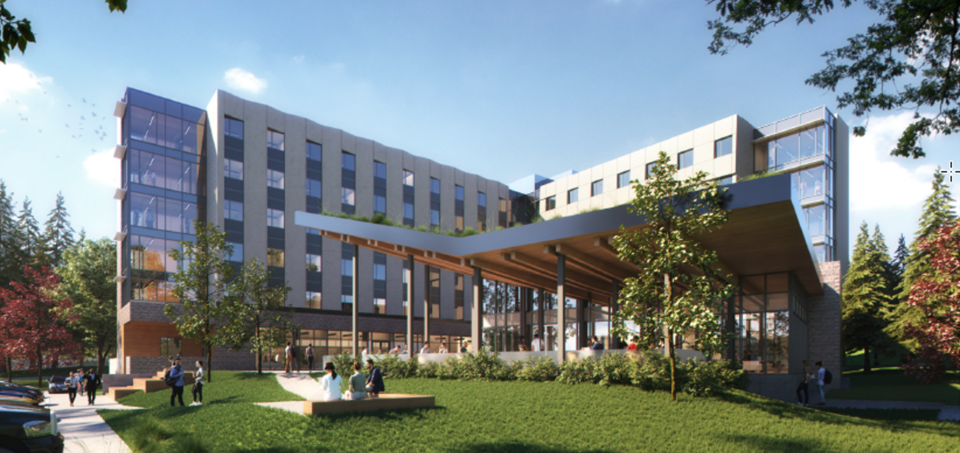Over 300 Capilano University students will soon get the chance to live walking distance to their classes after a 360-bed on-campus student housing project was approved by the District of North Vancouver this week.
The new six-storey student housing building will include five floors of dorm rooms on top of communal ground floor dining, study and laundry facilities. The project will include 50 single dorm rooms and 155 double-occupancy dorm rooms. The dining hall will seat over 200 students, with kitchen facilities designed to handle up to 500 students in case of future housing expansions.
The project is planned on a 1.5 acre site, on the eastern half of what is currently parking lot 2 at the north end of the university campus.”
“It’s an exciting thing for Cap,” said Ryan Blades, Capilano University’s director of facilities services and campus planning. The university has been a “commuter campus” since it was built, he said. “I think that this opportunity will change the culture in a really positive way. Now we'll have a community living on campus.
Blades said having on-campus housing will help attract students and lead to a reduction in students who have to commute to their studies.
“We know we’ve got demand through students surveys and through waitlists at our off-site leased housing facility,” he said.
Planning studies have all identified “a pressing need for student housing located on campus,” said Blades.
The university is currently renting a former boarding school on Old Dollarton Road from Darwin Properties for student housing. That lease expires in 2022 and while the university would like to extend the arrangement, it depends on Darwin’s plans for the site, said Blades.
Prior to the pandemic, all 390 beds at that rental property were filled and there was a waitlist of over 200 students, said Blades.
Capilano University first introduced a preliminary plan for on-campus student housing last year.
Since then, the biggest change to the plan has been to eliminate plans for an underground parking garage. Instead, parking demand from students living in residence will be handled by existing parking lots on campus.
The project will mean a net loss of about 220 parking spaces on campus overall, brining total parking spaces down to 1,223. But according to a staff report, a pre-pandemic survey showed even at times of peak demand, only 65 per cent of campus parking was in use. New flexible work-from-home options mean about 40 per cent of administrative staff will likely not be commuting either.
The project will be designed as energy efficient, and will include storage for over 100 bikes.
Maia Lomelino, president of the Capilano University Students’ Union, welcomed the news of on-campus housing. Having students living on campus will contribute to a more vibrant social scene as well as being more convenient, she said. Lomelino said students are happy to see the project is being designed with accessibility in mind. She also hopes it will be affordable for students.
The land use, building density and height of the project all conform to the current official community plan. Council approved variances to allow siting of the building on the existing parking lot and to decrease the overall number of parking stalls required on campus.
Approvals granted this week will also allow the building of a two-storey early childcare and education centre, which will replace a facilities building to the southeast of the student housing project. That project will add 74 childcare spaces to the existing 74 spaces on campus.
Council members were enthused about the student housing project. “I think that it's critically important for Capilano University and its future to provide housing on the site and to transition to a blended commuter residence model,” said Mayor Mike Little.
“This is going to be way nicer than any dorm I ever lived in,” added Coun. Megan Curren.
The rooms in the student housing are being targeted at a cost “10 per cent under market rate or potentially greater if we can,” said Blades.
The rental rate will also include a meal plan, common in many university residence halls. Rates will likely be similar to residence rooms at UBC, said Blades – but are expected to be higher than the rates being charged at the current off-campus student housing.
A final decision on rental rates will be made in 2024 taking into account the costs of the project as well as market and comparable student housing rates at the time, said Blades.
Darwin has also proposed to build 346 units of rental housing exclusively for CapU staff and students, in two six-storey buildings, plus a cafe, at 1310 Monashee Dr, immediately across the street from CapU’s own student housing.
The on-campus student housing is expected to open in 2024.




